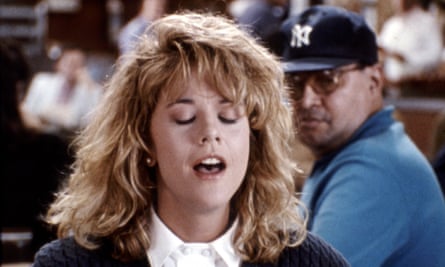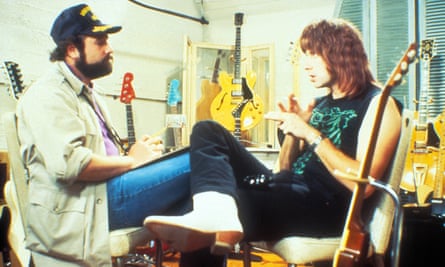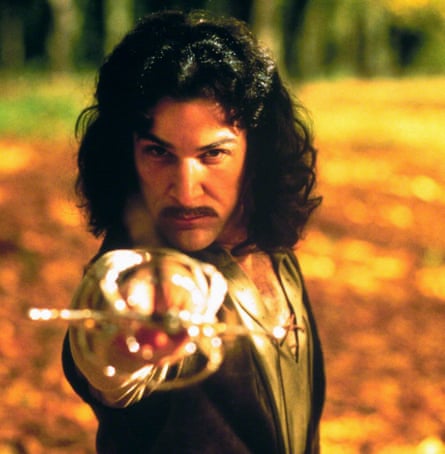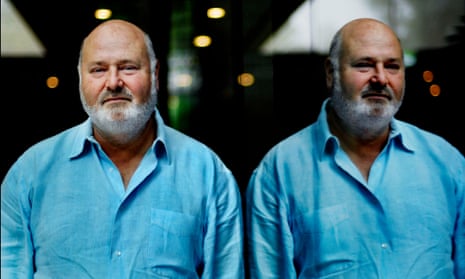I didn’t have what he was having but my lunch with Rob Reiner, director of When Harry Met Sally … and so much more, left me with a bigger smile on my face than a working lunch should. People say you should never meet your heroes, but Reiner is one of my heroes and, in this instance, the people are wrong.
As a director, Reiner had one of the longest, and most golden, runs in history: This Is Spinal Tap, The Sure Thing, Stand By Me, The Princess Bride, When Harry Met Sally …, Misery, A Few Good Men. With his production company, Castle Rock Entertainment, he helped produce many of the most enduring films of their time: In the Line of Fire, City Slickers, The Shawshank Redemption, Lone Star, Miss Congeniality. If you grew up in the 80s and 90s, and went to the movies a lot, both of which I did, few people will have shaped your cultural landscape as much as Reiner.
Also, he is a genuine political champion. He co-founded the American Foundation for Equal Rights, which was instrumental in overturning the ban on same-sex marriage in California. He also successfully campaigned for higher taxes on cigarettes in the state, to be funnelled into prenatal care and young childhood programmes. So you will not be wildly surprised to learn he is now – along with his equally impressive 96-year old father, US TV comic and actor-director Carl Reiner – a prominent voice against President Trump. By rights, Reiner, raised in enormous privilege, should be an entitled, spoilt schlub. Instead, he’s one of the hardest workers in town and, at the age of 71, is still fighting for the country to be better. There: now he’s your hero, too.
We arrange to meet in a restaurant not far from his home in Burbank, California, to discuss his life and career. But as I drive there I worry whether, by this point in his career, he might be sick of retelling anecdotes about Princess Buttercup and Nora Ephron. Will be grumpy? Or worse, bored? It becomes quickly apparent I need not have worried.
“So you come from London? You know, I spent time in London when I was making The Princess Bride,” says Reiner before he has even sat down, looking as content as a bear recalling an especially satisfying honey pot. “That was a great experience. We were shooting in Haddon Hall, which was built in 1086, and I’m sitting there with Chris Guest and Mandy Patinkin and we start singing that old rock’n’roll song, What’s Your Name [by Lynyrd Skynyrd] in a three-part harmony in this echoey old hall. I’m thinking: 1,000 years ago did anybody ever think people would be here doing this? It was just a surreal moment!”
Reiner loves talking about his movies the way people enjoy talking about their kids. Yet unlike most parents, Reiner seemingly has no ego about his babies. So when I tell him there’s not a week – a day – when a scene from one of his films doesn’t pop into my head, he looks down, makes an embarrassed snuffle and changes the subject by asking if I have any kids. When I ask if he got a kick out of seeing how Stand By Me was one of the main references in the first series of Stranger Things, he looks a little bewildered, says he heard about that, but never watched the show, and what, actually, is Stranger Things? The only time he acknowledges his legend is when he mentions that the fake orgasm scene from When Harry Met Sally … was recently voted one of the funniest scenes of all time in a movie poll. “Amazing,” he marvels.
Rob, I say, at least three scenes you directed are widely agreed to be among the best of all time: Sally’s fake orgasm; “These go to 11” in Spinal Tap; and “You can’t handle the truth!” in A Few Good Men. Don’t you know that? “It’s really something,” he says, looking down again. “So how old are your kids?”
Reiner acknowledges that his movies occupy a special place in the public’s heart, and I ask if he thinks that is partly because Hollywood doesn’t make movies like them any more. It is impossible to imagine a big studio taking on a smart romcom such as When Harry Met Sally … today, let alone a sui generis gem like The Princess Bride.

“I think that’s right. It’s a different time now and studios are making big event pictures and franchises and sometimes an R-rated comedy. So everybody who wants to make movies about people, politics or relationships has to find independent financing, and that’s what I do with Castle Rock Entertainment,” he says. Tellingly, Castle Rock was sold to Warner Bros in 1993, which is around the time Reiner stopped directing movies that have lasted in the way his early ones have.
“I mean, I’m making the movies I want to make, but it’s not with the same kind of support system that I had, and so it’s much more difficult,” he says. “Studios are looking for hundreds and hundreds of millions of dollars in profit and you’re not going to get it with a little movie. It’s like what Bernstein says in Citizen Kane: ‘It’s no trick to make a lot of money if all you want is to make a lot of money.’ But I came into this business to express myself and tell stories, not just churn out a product.”
Reiner grew up among entertainment royalty. His father, Carl, was one of the biggest figures in US TV in the mid 20th century and Mel Brooks, Sid Caesar and Norman Lear were all regular guests in the Reiner home. I ask Reiner if he ever talks with Michael Douglas – with whom he made And So It Goes and The American President – about how they, near uniquely among children of celebrities, have managed to become healthy adults and achieve success in their own right with seemingly little pain or struggle. “We’ve talked about this a lot,” he says. “It’s not painless – there’s a lot of struggle with all the identity stuff you go through. But we were saying you can count on one hand people whose parents achieved at a very high level and whose children also achieved. So it definitely binds us and I think that’s why we enjoy working together. Our heads aren’t swelled about it.”
Reiner credits his father for teaching him how to prevent head swell: “I saw the way my father dealt with people coming up to him, and he just acted like it was normal.”
He didn’t have VIP attitude? “No, he really didn’t. And you notice that as a kid.”
After achieving his own TV success in the 1970s when he starred in the sitcom All in the Family (the US version of Till Death Us Do Part), Reiner moved into film directing in the 80s. But it was not until his third movie, Stand By Me, that he felt he’d truly made his name.
“Spinal Tap was satire, and I love satire, but that was something my father had done. And The Sure Thing was romantic comedy and he had done those. So Stand By Me was the first thing I did that was purely an extension of myself, and that meant a lot to me,” he says quietly.

It was also the beginning of Reiner’s long alliance with Stephen King, who wrote the short story, The Body, on which Stand By Me was based. King liked the adaptation so much that Reiner was the only film-maker he would allow to take on his beloved novel Misery. The two have since worked together on The Shawshank Redemption, Dolores Claiborne and The Green Mile, and Reiner named Castle Rock after the town where many King books are set. Few people would have put the genial Reiner and the king of horror together, I say.
“I’m always interested in the script and the story, and Stephen King is a great American novelist. We’ve tended to stay away from his more supernatural books, but in everything he writes, the characters are great, the dialogue is great and the storytelling is incredible,” he says.
Another writer of pitch perfect dialogue is Nora Ephron and I tell Reiner that I think the reason When Harry Met Sally … is still so loved, aside from being so funny and true, is that it is fair on both genders: the man isn’t a bastard and the woman isn’t a bitch, as is usually the case in romcoms. “Right, exactly. In order for it to be good, it had to be honest on both sides. Nora taught me how she sees men and how she sees me and that’s what I got from her more than anything, aside from the fact that she’s so funny,” he says, slipping between the present and past tense when talking about Ephron, who died in 2012.

One thing Reiner learned making the movie was, of course, that women fake orgasms. A female friend mentioned this and, incredulous, he asked Ephron about it. “Oh yeah, that’s a thing,” she confirmed.
“My God!” Reiner cried. “Men don’t know about this, we have to put that in the movie!”
Proving how collaborative Reiner’s sets really are, Billy Crystal came up with the: “I’ll have what she’s having,” line, and Reiner brought in his mother, Estelle, to say it. “She thought it was hilarious,” he smiles. (Estelle Reiner died in 2008.)
When the film had its UK premiere, Princess Diana attended, and she sat next to Crystal. When Reiner realised the orgasm scene was coming up, he watched her, anxiously, uncertain if they were all about to be beheaded.
“But she laughed and laughed! And she leaned over to Billy and whispered: ‘I’d be laughing a lot more but I know everyone’s watching me.’” According to Reiner, she later asked for the movie to be sent to Kensington Palace so she could watch it with her friends, and laugh without restraint.
Ephron later said she based the character of Harry – the miserable, divorced Jewish romantic lead – on Reiner, who was at the time divorced after his marriage to Penny Marshall ended. During pre-production of the movie, he spotted a copy of Premiere magazine with Michelle Pfeiffer on the cover. “I’d met her a few months before, she seemed like a nice person, and I read she was getting divorced, so I said to Barry Sonnenfeld [When Harry Met Sally …’s director of photography], ‘I’m going to give her a call.’” (This is the only time during our lunch where Reiner’s privilege shines through: only someone who has truly led a gilded life would conduct their dating life via the covers of Premiere magazine, and think it sounds totally normal to say so.) Sonnenfeld nixed that: “You’re not going to call her, you’re going to marry my friend Michele Singer,” he declared.
Reiner wasn’t convinced, but three-quarters of the way through the film shoot he spotted a “very attractive woman” on the set who turned out to be Singer. They have now been married for almost 30 years and have three “really great” kids. Meeting Singer convinced Reiner to hastily change the ending of the film. “Originally, Harry and Sally didn’t get together. But then I met Michele and I thought: OK, I see how this works,” he grins.
Reiner and Ephron went on to work together again on Sleepless in Seattle, in which Reiner plays Tom Hanks’s friend. I tell him his Cary Grant impression is my favourite part of the movie.
“I’ll tell you my favourite Cary Grant story,” says Reiner. “When my father and Mel Brooks made [the comedy album] The 2000 Year Old Man, Mel had an office on the Universal lot and he used to see Cary Grant all the time and Cary loved the album. And he said …” – at this point, Reiner launches into a Cary Grant imitation that is even more enjoyably absurd than his one in Sleepless in Seattle – “‘I’m going to England, can you give me extra copies so I can give one to the Queen?’ And he then comes back from England and Mel says: ‘Well?’ and Cary says: ‘She loved it, absolutely loved it. She thought it very, very funny.’ And Mel thinks: ‘Wow, the biggest shiksa in the world! We thought the album was too Jewish but if she can get it, anyone can!’”
I wonder how a man as amiable as Reiner coped with mega-egos like Tom Cruise and Jack Nicholson on A Few Good Men. “You know, people only act up out of insecurity, and when they make it difficult I just say: ‘We’re playing make-believe here – enjoy yourself!’” he says, his Jewish New York accent flashing through. One person who made things difficult was Mandy Patinkin, a notoriously prickly actor, when they were filming The Princess Bride. “He had a tough time at the beginning because he was so intense about wanting to be great. And he is great! He had done Evita, Sunday in the Park with George on Broadway, Tonys and everything! He was all: ‘I gotta be great, I gotta be great,’” Reiner recalls, and the image of Patinkin treating his character, Inigo Montoya, as if it was Hamlet is a memorable one. “Finally I said: ‘Mandy, just relax!’”
It is impossible to mention A Few Good Men, a film about the dangers of power without legal checks, and not discuss the US’s current political situation. “We’re in a place right now where democracy is on very shaky ground, in America and all over the world, and the autocrats’ playbook is to sow confusion and insecurity and blame other people for everyone’s lot in life, and then the autocrat comes in and says: I alone can fix this. It happened in Britain with Brexit, and we know how that was funded, and it’s the same playbook with Trump,” says Reiner. “America is the world’s oldest living democracy, and there are no guarantees it will survive. For great civilisations, the life span is usually 250 to 300 years, and we’re 242. So we’ll see.”
As it happens, his wife Michele is a photographer and back in the 80s she took the photo of Trump for the cover of his self-mythologising book The Art of the Deal. “So she has a lot to atone for,” says Reiner with mock severity.
Reiner has been an energetic anti-Trump tweeter, but he knows that on social media he is singing to the choir. In an attempt to reach the other political side he has become an occasional guest on Fox News, countering the presenters’ hysteria and lies with calm and facts.
“I try to have a real conversation that isn’t throwing propaganda around. But no one wants to have that,” he shrugs.
Does he worry that he will be dismissed as another Hollywood elitist? “Oh sure, they call me that, but I actually understand policy so I don’t put myself in that category,” he says with a hint of impatience. In fact, Reiner nearly ran for California governor against Arnold Schwarzenegger. Does he regret not being a politician now, so he could take on Trump in a more direct way?
“No, I don’t want to be an elected official. I want to get things done,” he says. After taking on tobacco and homophobic legislation, his next target is the gun lobby.
It is time for Reiner’s next appointment but before he leaves I ask one final question: aren’t massively successful Hollywood producers and directors supposed to be egomaniacal monsters? What went wrong?
“Haha! It’s true. But I want everyone around me to feel comfortable and happy. And then I can come into work and be like: ‘Hey, I get to spend today with these people today! Isn’t that great? Aren’t I lucky?’”
Reiner’s latest film, Shock & Awe, is in US cinemas, and on DIRECTV, on demand and iTunes. It will be available in the UK on DVD and Digital HD on 10 September

Comments (…)
Sign in or create your Guardian account to join the discussion